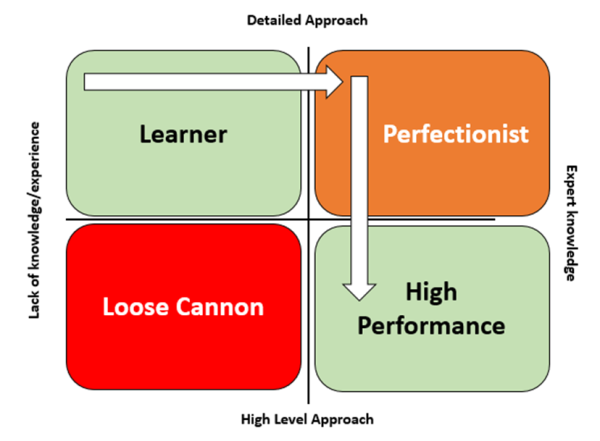“You cannot connect the dots looking forward, you can only connect them looking back”, as Steve...
 Are you an FP&A professional who likes to operate in the detail or do you prefer to see things at a high level?
Are you an FP&A professional who likes to operate in the detail or do you prefer to see things at a high level?
Are you a perfectionist or is near enough good enough?
The former is a common interview question for FP&A roles, the latter well I guess we would all like to think we are perfect.
Take this example. You have been given a very important piece of work to do that will have high impact on the organisation you work in. It's urgent. And there is pressure to ensure it is accurate and reliable.
Which end of the spectrum do you operate at? The person who goes away and spends a significant amount of time looking into every detail and attempting to come to an answer or recommendation that is perfect. Or the person who takes the information known, makes a couple of high-level assumptions and produces something that sort of feels right (and was potentially done on the back of an envelope).
As an FP&A professional this situation and decision are at the forefront of most things we do. And as finance people, it is drilled into us from an early stage in our career to be thorough and accurate. Cross-referencing every part of the file to another part of the file to ensure it stands up in court is common practice. Keeping timesheets for every 6 minutes we spend on a client. Everything we do conditions are for the detailed approach.
Unfortunately in a pressurised environment of a commercial organisation where decisions are required quickly and accurately, because customers can be unreasonable, being thorough and detailed needs another solution. Being perfect can mean missing opportunities.
So what is the preference for an FP&A professional, detailed or high level? Should we go to Perfecttown, where detail rules and nothing ever gets completed?
My advice is to not see these things as mutually exclusive (and an “or” question) but more a polarity to high performance. And this polarity is dependent on your knowledge or experience in something. If you know little about something, this lack of knowledge forces you to spend time to gain an understanding. Once you have gained that understanding, the law of diminishing returns kicks in where any further time spent acquiring knowledge does not actually add any value and you need to move into a high-level approach to operate at a high performance.
The following model helps to demonstrate this with each quadrant requiring a different approach:

Loose Cannon; this quadrant is for people who have very little knowledge in a subject and no interest in learning the detail. Their depth of knowledge is low and they would rather just know the headlines. They often like to wing it (and use fancy words to portray knowledge) or employ people below them who will look into the detail. Asking this person for advice is considered very risky as it will not come from a place of great depth or will have been garnered through their staff and may miss important details or be filtered inappropriately. These people often make mistakes and lose credibility very quickly within an organisation (and if they are in management are very frustrating for the team below them). They will apply a high-level approach to most things and risk providing poor recommendations.
Learner; a learner is also someone who has little knowledge or experience of something but is keen to get an understanding and is willing to spend the time to understand it. They will be very eager to gather information that helps them to learn more about something. This approach is often a very detailed approach as time is required to gather, understand and interpret what you have come across. For a finance individual this is often in the new stages of a role when you are determining the technical aspects of the role, who does what, how do I get information out of the system, or simply how does this spreadsheet work. This is a critical area for any finance individual wanting to be a successful business partner to other functions as you need to be prepared to understand their world.
Perfectionist; this is a person who has great knowledge or experience in something but is unable to move away from the detail. A giveaway if you are in this position is that you seem to have a lot of work mounting up, are more than likely working very long hours and nobody can understand why. You are risk averse to giving recommendations and insight despite being in a position where you should have a great depth of knowledge on something and when asked for advice the default response is “its complicated”. A perfectionist spends too much time in the detail when a high-level approach is required and their depth of understanding on something warrants a simpler approach. If you find yourself in this quadrant you either need to go back to the learning quadrant and spend time in the detail to understand it better in order to simplify it, or quickly recognise you are spending too much time in the detail, trust your knowledge and move into the high-performance quadrant.
High Performance; this quadrant is the equivalent of mastery and if you have taken the journey from top left to bottom right you will have acquired enough knowledge on something to allow you to operate at a higher less detailed level. You will have plenty of envelopes in your office with just the back of them written on. You know your information well, you also know where to go to get information you aren’t able to recall instantly. You can identify when something isn’t quite right and requires more depth of understanding. In short, you have spent time understanding something at the required depth to be able to operate at a high level.
Based on this framework it is clear to see that the answer to the question of are you a detailed person or a high-level operator is: “It depends”. And it will depend on your depth of knowledge on something. Try to do it shorthand with no knowledge and you risk your credibility (loose cannon). Likewise, being too detailed when your knowledge suggests a quicker response (perfectionism) will also damage your credibility, not to mention your available time. Instead, get involved in something, spend the time to learn it and understand it well enough so that you can operate at a high level when asked for your advice on things.
And remember, the enemy of good is perfection. And as always if you can’t explain it simply, you don’t understand it well enough.
Find more information about FP&A people on Andrew's website: https://www.andrewjepson.com/
Subscribe to
FP&A Trends Digest

We will regularly update you on the latest trends and developments in FP&A. Take the opportunity to have articles written by finance thought leaders delivered directly to your inbox; watch compelling webinars; connect with like-minded professionals; and become a part of our global community.




